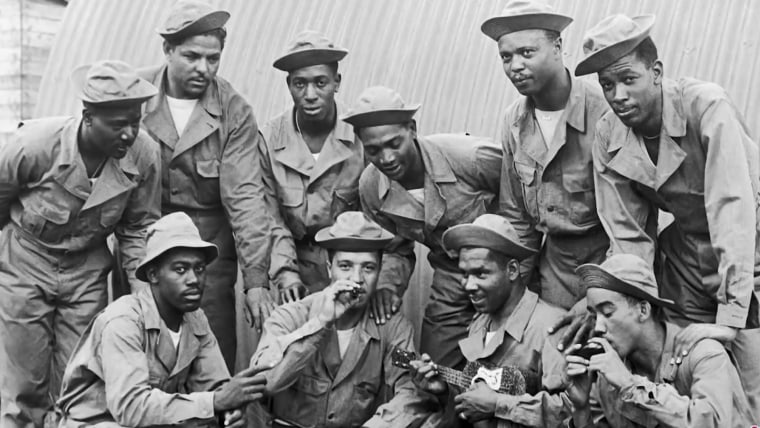Black veterans who ask the Department of Veterans Affairs for physical or mental health benefits are less likely to get them than their white counterparts, according to new data compiled by the VA.
In fiscal year 2023, 84.8% of all Black veterans who applied for physical or mental health benefits were given assistance by the VA, compared to 89.4% of their white counterparts who applied. The VA data includes information dating back to fiscal year 2017, which shows that white veterans have had a higher grant rate than their Black counterparts every year.
On Thursday, the VA launched a new Agency Equity Team to try to figure out why health and other benefits are doled out at different rates and whether the VA can level the playing field for Blacks, women and LGBTQ+ veterans.
“At VA, it’s our mission to serve all Veterans, their families, caregivers, and survivors as well as they’ve served our country. This new Agency Equity Team will help us deliver on that promise,” said VA Secretary Denis McDonough said in a statement. “The team’s first order of business will be identifying any disparities in VA health care and benefits and eliminating them.”
The new data about white versus Black veteran benefits reinforces NBC News reporting from earlier this year that Black veterans were denied disability benefits for post-traumatic stress disorder at higher rates than their white counterparts, according to data from 2017. The disparities were highlighted in a series of reports by NBC News Now and NBC local stations in a series called “American Vets: Benefits, Race and Inequality.“
The new data shows that from FY 2017 to FY 2023 that trend has decreased slightly, but a higher percentage of Black vets are still denied PTSD benefits than white vets.
VA press secretary Terrence Hayes called the creation of the Agency Equity Team “a unique opportunity” to re-engage with veterans who filed claims in the past and were denied and may have lost faith in the system.”
“They may have lost trust with VA because of those denials, but now we have a unique opportunity to bring them back into our health care system or to get them to re-apply to get the benefits that they earned,” Hayes said.
Despite the fact that Black vets have a steeper hill to climb to be granted assistance, the overall percentage of Black veterans who receive benefits is actually higher than white vets because Black veterans apply at a much higher rate. Nearly half of the 3 million Black veterans alive today have applied for benefits versus fewer than one-third of nearly 15.5 million white veterans.
About 36.5% of all living Black veterans are receiving VA benefits, compared to 28.4% of white veterans.
“Studies have shown that Black veterans are more likely to serve in combat, they are more likely to report PTSD and other health conditions, and they are more likely to use health care than their white counterparts. So all of that may explain why there’s a higher percentage of Black veterans who apply for and receive disability benefits from VA,” said VA Under Secretary for Benefits Josh Jacobs.
“The bottom line from this data is that there’s more work to be done to fully understand the trend and so that’s why we’re standing up this new Agency Equity Team,” said Jacobs.
The goal of the VA’s new equity team, officially known as the I*DEA (inclusion, diversity, equity and access) Council, is to eliminate gaps in VA health care and benefits to ensure historically underserved veteran communities receive fair treatment.
At issue are the tax-free benefits that the VA provides to veterans to compensate for injuries, illnesses or disabilities that arose during service or were worsened or aggravated by their military service.
The council will also examine and address obstacles to hiring, promoting and retaining employees. Laurine Carson, who has worked for the VA at the state and national level for more than three decades, will head up a new Equity Assurance Office that will focus specifically on issues concerning the benefits system and report back to the I*DEA Council.
The new initiative will go beyond racial disparities to examine challenges faced by other groups, including women, LGBTQ+, tribal communities and veterans who live in rural areas.
VA officials could not provide data about differences between benefit grant rates for other underserved populations.
“We are digging deep to understand what’s going on and so we’re doing that by looking at the data,” Jacobs said.
Hayes, the VA press secretary, said the I*DEA Council and the Equity Assurance Office will “peel that onion back to determine how that works with Black versus white veterans, or LGBTQ+ veterans, or our women veteran population. The whole goal is to ensure that any veteran who comes to the department and is filing their claim receives equal treatment across the board.”
Jacobs hopes this initiative will encourage veterans from those underserved groups to re-apply for benefits.
“I want them to know we are actively looking into any disparities that exist in VA and we’re going to eliminate them. And as we do that we’re going to work to earn your trust or re-earn their trust day by day and we’re going to do that by being transparent by getting you the healthcare and the benefits that you deserve,” Jacobs said.








